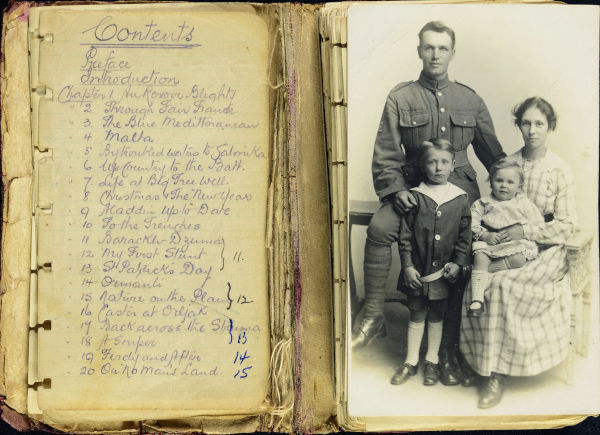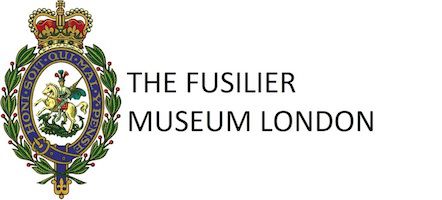In 2010 the museum was gifted the diary of Sergeant Harry Stephen Williams. In 40 chapters Williams records his experiences of the First World War in such chapters as; Au Revoir Blighty, By Troubled Waters to Salonika, To The Trenches, On No Man's Land and finally in chapter 40, Homeward bound.
Who was Harry Stephen Williams?

Harry was born on the 21st October 1886 in Wood Green (St. Pancras), Middlesex to Harry and Alice Williams. By the time of the 1911 Census Harry was recorded as a Stationary Dealers Clerk. On the 14th August 1912 Harry married Jane Martha Taylor at St. Michael's Church in Wood Green. They later had two Sons, Harry and Thomas.
In December 1915 Harry attested to join the army under the Derby Scheme but was not called to the Colours until the 19th May 1916. The Group Scheme (generally known as the Derby Scheme, after the Director-General of Recruiting, Lord Derby) was an attempt to to encourage men to volunteer for service without the need to immediately join the army. Men who volunteered were put into groups according to their marital status and age. These groups were then called up when required. The scheme operated between 15th October 1915 and the end of February 1916. Volunteering ceased on 15th December 1915 with the introduction of conscription.
Harry trained with the 27th and 6th Battalions in the UK prior to his transfer to the 3rd Battalion. The 3rd battalion arrived in Salonika (now known as Thessaloniki), Greece on the 17th November 1917. The diary he kept, details his time in Salonika and then on the Western Front. As sections of the diary were completed he sent them home to his wife for safekeeping. The Battalion returned to the Western front in July 1918. They entered the front line on the 4th October and remained in action until the end of the war suffering heavy casualties throughout.

After returning home Harry worked for the Jaeger clothing company for forty years, the last ten of which were as Advertising Manager at the Head Office. He was a lifelong member of the Salvation Army where he had been a Bandsman and later Bandmaster for the Wood Green Corps Band. Harry died in Epping, Essex on the 11th May 1958 at the age of 72.
The Salonika Campaign
This campaign is the least known of those in which British Forces took part during the First World War. It was an area in which the British had very little interest in becoming involved.
Initially Allied forces from various countries were landed to assist Serbia which had been invaded by a combination of Central Power armies. Owing to Bulgaria allying itself to the Central Powers in September 1915 the Allies were forced to withdraw to Salonika during December 1915. The line remained fairly static until the Allied Offensive that began in May 1918 and led to the Bulgarian government surrendering in the September.
British battle casualties were approximately; 4,000 killed, 3,800 died due to illness,16,300 wounded and 2,600 Prisoners of War. However these figures were far outweighed by sickness which added an astonishing 504,000 non-battle casualties to the total of whom 162,500 suffered from malaria. This high number of non-battle casualties represents the many repeat trips soldiers were forced to make to hospital for treatment.
The museum is fortunate to hold many such personal accounts within its collection. In 2013 the museum gained funding from the Heritage Lottery Fund, part of which contributed to the digitisation of a number of these First World War diaries and letters. Over the last few years and with the help of willing volunteers these have now begun to be transcribed. If you would like to learn more of Sgt Williams's story in his own words you view the diary and read a transcription via our online catalogue (record number
RFM.1645).
 Harry was born on the 21st October 1886 in Wood Green (St. Pancras), Middlesex to Harry and Alice Williams. By the time of the 1911 Census Harry was recorded as a Stationary Dealers Clerk. On the 14th August 1912 Harry married Jane Martha Taylor at St. Michael's Church in Wood Green. They later had two Sons, Harry and Thomas.
Harry was born on the 21st October 1886 in Wood Green (St. Pancras), Middlesex to Harry and Alice Williams. By the time of the 1911 Census Harry was recorded as a Stationary Dealers Clerk. On the 14th August 1912 Harry married Jane Martha Taylor at St. Michael's Church in Wood Green. They later had two Sons, Harry and Thomas. After returning home Harry worked for the Jaeger clothing company for forty years, the last ten of which were as Advertising Manager at the Head Office. He was a lifelong member of the Salvation Army where he had been a Bandsman and later Bandmaster for the Wood Green Corps Band. Harry died in Epping, Essex on the 11th May 1958 at the age of 72.
After returning home Harry worked for the Jaeger clothing company for forty years, the last ten of which were as Advertising Manager at the Head Office. He was a lifelong member of the Salvation Army where he had been a Bandsman and later Bandmaster for the Wood Green Corps Band. Harry died in Epping, Essex on the 11th May 1958 at the age of 72.